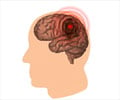A new research has found that middle-age men with upper end of normal blood pressure are at an increased risk of suffering from atrial fibrillation later in life.

"Women with blood pressure on the upper end of the normal range have been shown to be at increased risk for AF," said Irene Grundvold, M.D., lead author of the study and consultant cardiologist in the Cardiology Department at Oslo University Hospital in Ullevaal, Norway. "We set out to determine if the same was true for men who are not yet considered hypertensive." For 35 years, researchers followed 40- to 59-year-old healthy Norwegian men from a database of 2,014. They recorded the men's blood pressure at the start of the study and tracked health events such as AF. They conducted a follow-up survey an average of seven years after the initial survey, in which 1,758 men participated. Beyond seven years, only men who were considered healthy were included in analysis, which reduced the number of participants to 1,423.
U.S. guidelines define high blood pressure as systolic pressure (top number) at 140 millimeters of mercury (mm Hg) or higher and diastolic pressure (bottom number) at 90 mm Hg or higher. They define pre-hypertension as systolic pressures from 120 to 139 mm Hg and diastolic pressures from 80 to 89 mm Hg.
In the study, while upper-normal systolic blood pressure was 128-138 mm Hg, the authors acknowledge that the range differs from current European blood pressure guidelines.During the study's follow-up, 270 men, or 13 percent, developed AF.Major findings from the study include:•Men with systolic blood pressure of 140 mm Hg or higher at the start of the study had a 60 percent increased risk of developing AF, compared to men with normal systolic blood pressure. •Men with systolic blood pressure of 128 to 138 mm Hg (upper normal) had a 50 percent increased risk of developing AF during follow-up, compared with men with systolic pressures below 128 mm Hg (normal).•Men with diastolic blood pressure of 80 mm Hg or higher at the start of the study had a 79 percent increased risk of subsequent AF, compared with men with diastolic blood pressure below 80 mm Hg (normal).•On average, atrial fibrillation developed 20 years after baseline.
"Our results indicate that men with upper-normal blood pressure appear to have a higher risk for AF than men with lower blood pressure," Grundvold said.
In an accompanying editorial, Paolo Verdecchia, M.D., notes that global preventive strategies are urgently needed to reduce the burden of AF.Because the risk of AF increases among men and women in the pre-hypertension range, it's important that further studies clarify the relationship between blood pressure control strategies and the risk of AF, wrote Verdecchia who is chief of the division of Medicine at the Hospital of Assisi in Assisi, Italy.
Advertisement
Source-Eurekalert














